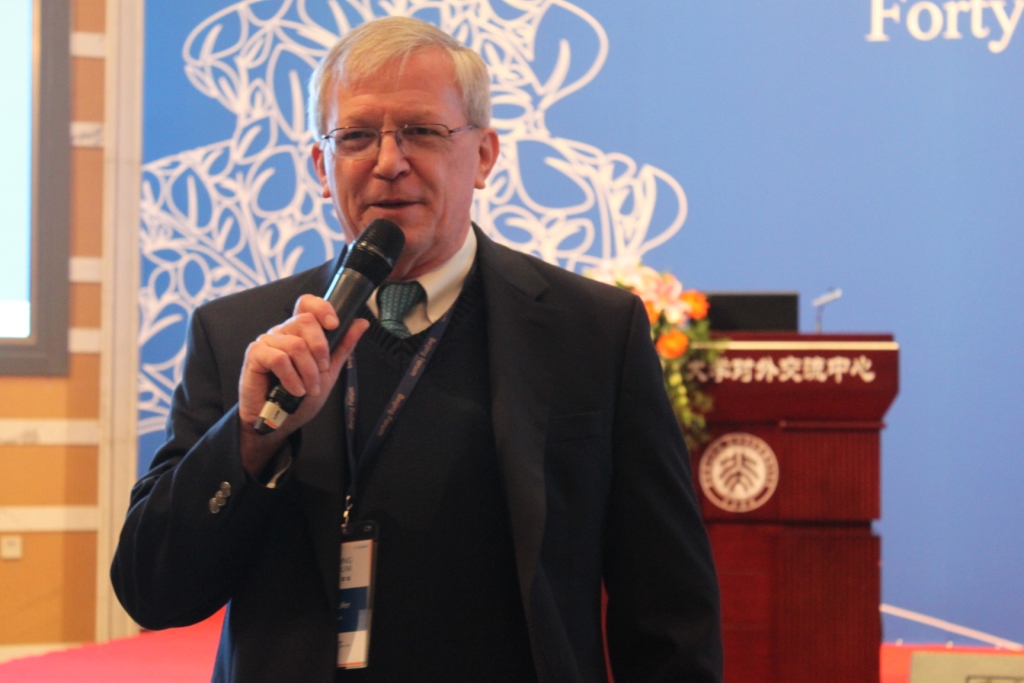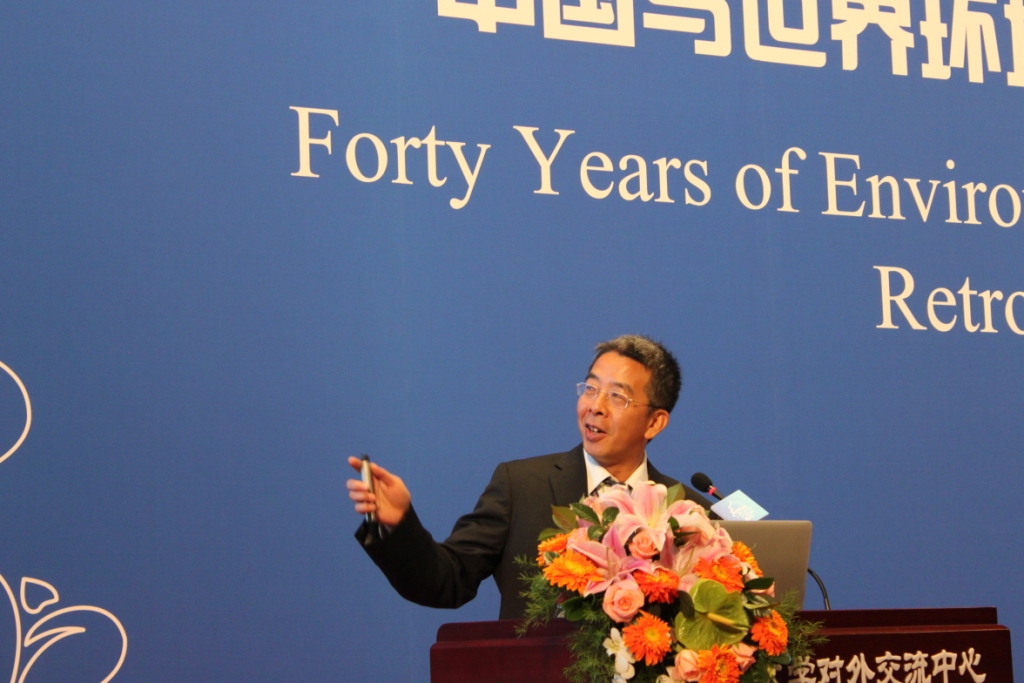
The fourth session of Beijing Forum (2013) panel“Forty Years of Environmental Protection in China and the World: Retrospect, Prospect and Institutional Innovation” was held at Sunlight Hall, Yingjie Exchange Center of Peking University on the morning of Nov. 3rd, 2013. The theme of this session is “Policy and Actions”. Mr Roger Raufer, president of Raufer Ltd., chaired this session.

Figure 1. Mr Roger Raufer
Professor Jae-Chun Kim from Sogang University made the first speech on “China’s Climate Change Mitigation Policies: Respective Roles of State and Non-state Actors”. He startedthe topic with two questions--How has China’s climate change mitigation policy been shaped and evolved, and what are the respective roles of state and non-state actors in China’s climate change mitigation policy making process. Then he introducedthat his study utilizedthe Adam and Kriesi policy network theory as an analytical framework, as well as twocompeting models to explain China’s policymaking process: the broad rationality model and the power model. He point out that policy outcomes and policy change could be determined by several factors: international factors, domestic factors and policy-domain specific factors. He further tabulated the evolution of China's climate change coordination committee, and he summarizedthe major climate change policies and measures adopted in China, e.g., closing inefficient industrial plants.One of the figures shows that in China annual growth rate changes of GDP surpassed that of carbon emissions in recent years. Finally, he madesome notable points infuture climate change mitigation policies forChina.
Professor Craig Hart, from School of Environment & Natural Resources, Renmin University of China, expressed his views on “China’s Emissions Trading System: Lessons from SO2Trading”. He firstly explainedclimate policy motivations which include addressing climate change,achieving energy efficiency and security targets, and building up international standing. Based on his data analyses, he forecastedthat in 2030 the cumulated share of CO2 emissions from China will surpass that from US, which suggests China have to take further action to tackle the CO2 emissions. Then he displayedthe evolution of China SO2 Tradingwhichstarted from 6 cities pilots in 1994, followed by programs of wider coverage in later years.Useful lessons werelearned from SO2emission trade system (ETS), e.g., unpredictable or unfair allocation method, weak local penalties or legal basis. Finally he emphasizedthe key pointsfor Greenhouse Gases(GHG) ETS: 1) MRV is basis for credibility of market, 2) penalties and enforcement is critical, 3) allocations based on sectors, 4) separately compensate for economic effects, 5) command and control should integrate with market, not suppress market, 6) role of government in market, and 7) progressive cap and price mechanism.
Professor Geoffrey Wall, from Geography and Environmental Management, Faculty of Environment, University of Waterloo, deliveredthe speech titled “Reflections on tourism planning in China”. His presentation started with a question that why do destination areas want tourists. As for the Chinese context, although tourism achieved many successes, e.g., tourism grew over last 25 years;it is time right forevaluation since 2013 statistics of international visitors to China are disappointing so far. There some limitations for product: 1) narrow focus on attractions(one example from spring providerswho do not care about the source of water but attribute the duty to environment protection authorities);2) limited integration;3) insufficient strategy;4) plans not public documents(residents within the specific attraction may not be aware of the plan or the coming construction);5) currently top-down (need for involvement of more stakeholders);6) expert driven; 7) not based on adequate data and analyses;and 8) status of tourism authorities weak. Given this, goals could be better achieved if both planning process and products improved.
Professor Carla Freeman, from SAIS of Johns Hopkins University, made presentation on “China as a Global Environmental Actor: Responsible stakeholder or free rider?”.In last 40 years China has made great efforts in environmental protection field at national and global levels, e.g., China early participated the global environmental forums and conventions such as Stockholm Conference in 1972. As an international actor, China holds two principles. The first one is the right to develop as a developing country, e.g., Wen Jiabao, the former prime minister of China, statedin 2009 that “China must fight for its due rights for development…”. The secondone is sovereignty or noninterference,since China identifies herself as the victim of imperialism. However, these two principles may be hard to reconcile with global environmental governance, and these principles could influence China’s role as a global environmental actor (GEA). China has sought to engage in finding solutions to international environmental challenges according to its two core principles, as well as its own capabilities. Professor Freemantooktrans-boundary watercourses coordination as an example for environment protection collaboration between China and other countries. She suggested China continuingto:1) make progress on domestic front environmental governance;2) change economy and energy structure;3) strengthen China-US cooperation;and 4) think creatively about the principles of development and sovereignty in the context of global environmental responsibility.
Professor Jianxin Hu from College of Environmental Sciences and Engineering, Peking University,addressed“Hydro fluorocarbons (HFCs) Management in China: Challenges & Opportunities”. After an overview of the contribution to GHG emission by implementing Montreal Protocol in China and the world, he briefly introducedthe background of HFCs, e.g., HFCshave high Global Warming Potentials, and thus they are regulated by UNFCCC and Kyoto Protocol. He point out that, HFCs will become a big problem for climate change, since observations show that HFC concentrations in earth atmosphere grew very fast in last several decades, andthe forecasted consumption and emissions will grow to a sustainable amount by 2050. Thus this field needs more and more studies focusing on scientific observations and environment managements. He also presentedsome research results fromPeking University, including the predicted HFCs emissions in China under the business-as-usual scenario for MAC, RAC, PU and HFC-23 sectors. Some chances for phasing down HFCs are coming, for example, the announcement in G-20 meeting.Based on his analyses, he forecasts that: 1) HFC-23 may be the first HFC be regulated;2) some of HFC-410A for Residential Air Condition is being voluntarily avoided;and 3) HFC-134Afor MAC will be the first sector to be phase down.

Figure 2. Professor Jianxin Hu
At the end of this session, Professor Shiqiu Zhang, Panel Chair delivered her thanks to all participants in this forum, especially to the speakers for their great presentationsand ideas, and all the supporting staff and volunteers on behalf of the panel organization: College of Environmental Sciences and Engineering of Peking University and China Environmental Education Center under Ministry of Environmental Protection.
Professor Shiqiu Zhang further statedthat now China is in a period of fast transition, the conflicts betweenenvironment and development and conflicts among the social groups are severe and there are great needs to find out the conflicts solution with wisdom. She pointed out that to face the challenges, it needs 1) the strong political wills and commitment at various government level to promote the sustainable development strategy and to implement the eco civilization from a concept to a down to earth action; 2) the further clarify that the government has the responsibility to protecting the environmental assets and natural caption and to provide the sound environmental services; 3) the government should make and use the right policy not only to give the consideration of effectiveness in short term but also for long term welfare improvement and behaviors changes with consideration of least cost strategy, and needs to reform the environmental regulatory system to avoid further policy and government failure especially the possible negative income distribution effects by using the environmental assets and natural capital; 4) the enterprise should comply the environmental regulation and to take the social responsibility; 5) most importantly, a growing and maturecivil society and public participation is an important opportunity for China to avoid possible severe social conflicts due to the environment, Professor Zhang then stated that dialogue, communication, mutual understanding among various stakeholders and social groups are the fundamental basis for addressing the conflicts. Professor Zhang believes that, deep, integrated and systematic scientific and social studies could provide important information and “fact” basis for the multiple stakeholders’ involvements and conflict solution. She then express the sincerely hope that to collaborate with the whole community, to promote social-economic-environmental relationship building, to provide more scientific support for government decision-making, and behaviors changes. Sheconcluded the sessionwith an old Chinese saying which she define as one of the principle of the environmental ethics - We must do good rather than evil, on however humble a scale.